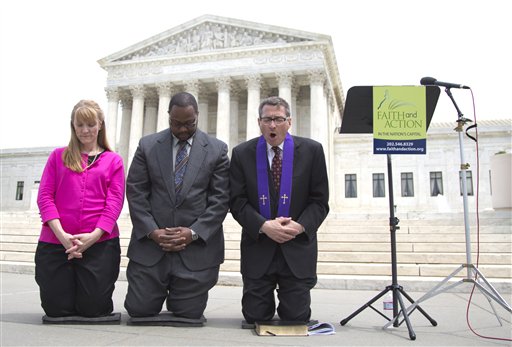US Supreme Court allows prayer at government meetings

Rev. Dr. Rob Schenck, of Faith and Action, right, prays in front of the Supreme Court with Raymond Moore, center and Patty Bills, both also of Faith and Action, during a news conference, Monday, May 5, 2014, in Washington, after speaking in favor of the ruling by the court’s conservative majority that was a victory for the town of Greece, New York, outside of Rochester. A narrowly divided Supreme Court upheld decidedly Christian prayers at the start of local council meetings on Monday, declaring them in line with long national traditions though the country has grown more religiously diverse. AP
WASHINGTON—The US Supreme Court Monday upheld the right to pray at government meetings, in a divided decision that said the practice did not violate religious freedoms.
Voting along ideological lines, the court’s five conservative justices said that “the nation’s history and tradition have shown that prayer in this limited context could coexist with the principles of disestablishment and religious freedom.”
At issue were town meetings in Greece, New York, where clergy had been invited to offer a prayer, which in the last eight years had been exclusively Christian.
Two residents, an atheist and Jewish individual, brought the case before the Supreme Court arguing that the practice was unconstitutional, particularly because it was solely Christian.
The high court’s five conservative justices, all Catholics, found their arguments “unpersuasive,” while its four progressives—three Jewish and one Catholic—voted to end the prayers.
Article continues after this advertisement‘Accepted by framers’ of Constitution
Article continues after this advertisementWriting for the majority, Justice Anthony Kennedy said that the practice was one “accepted by the framers” of the Constitution.
“There is no indication that the prayer opportunity has been exploited to proselytize or advance any one, or to disparage any other, faith or belief,” the decision said.
The prayers may have invoked “the name of Jesus, but they also invoked universal themes, e.g. by calling for a spirit of cooperation,” the decision said.
The prayers neither “denigrate, proselytize or betray an impermissible government purpose,” it added.
The basis for religious freedoms in the United States is found in the First Amendment of the US Constitution, which states that “Congress shall make no law respecting an establishment of religion, or prohibiting the free exercise thereof.”
Conservative and faith-based groups were jubilant over the decision.
“Speech honoring God and invoking His blessing on our land should be welcomed, not treated with hostility,” said Ralph Reed, leader of the Faith and Freedom Coalition.
‘Long and cherished tradition’
“With today’s decision, the government officials that faith-based voters help to elect can provide a forum for such expressions without fear of being reversed by future courts,” Reed said, adding that prayer at public events “is a long and cherished tradition in our country and is woven into the fabric of American society.”
A longtime activist for conservative causes, Reed said that with the new high court ruling in hand, his group would “redouble its efforts” to foster the introduction of prayer at even more gatherings of town boards, school groups and city councils across the United States.
Another conservative group, the Family Research Council, also applauded the US high court.
“The court today has upheld our first and most fundamental freedom,” said Tony Perkins, president of the group, in a statement.
“The court has rejected the idea that as citizens we must check our faith at the entrance to the public square,” Perkins said.
“This is an historic victory for all Americans of faith and for the common-sense reading of the Constitution itself.”
But the American Civil Liberties Union, which aims to champion the rights of individuals, said it was “disappointed.”
“When government supports one religion over others, people who are not members of the favored religion are made to feel like outsiders by their government,” said Arthur Eisenberg, legal director of the national group’s New York affiliate, which called the decision a victory for “town-sponsored sectarian prayer.”